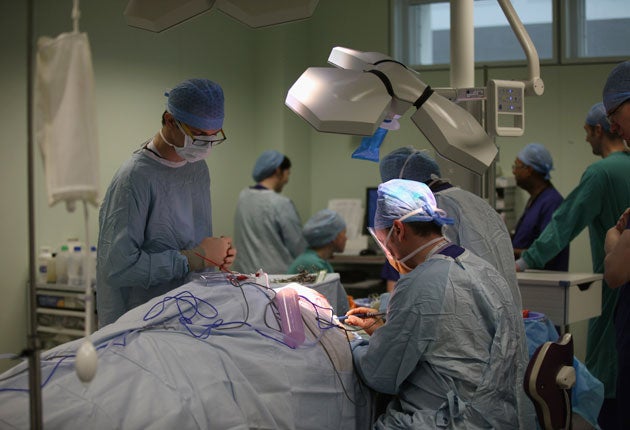Children's heart units close in long march to 'modernisation'

Ten years after a public inquiry into the worst hospital scandal of the 1990s called for children's heart surgery to be concentrated in fewer, larger centres, a committee representing every NHS trust in England yesterday finally made the first move to implement it.
Sir Ian Kennedy's 2001 inquiry into the Bristol children's heart surgery disaster, in which scores of babies died or were maimed by sub-standard treatment, concluded that lives had been sacrificed to maintain the hospital's status as a specialist heart unit and to keep the funding that went with it.
Yesterday, at a public meeting in London, the Joint Committee of Primary Care Trusts (JCPCT) called for the closure of four, and possibly five, of the existing 11 units carrying out paediatric cardiac surgery to maintain patient safety.
Two further reviews were conducted following the Kennedy inquiry and a follow-up report by him ranking the units was published yesterday, but the decade-long negotiations highlight the immense challenge faced by those who would "modernise" the NHS.
The hospitals earmarked to lose children's heart surgery will be selected from among the Freeman in Newcastle, Leeds General Infirmary, Glenfield in Leicester, Oxford Radcliffe (which stopped operating last year after several deaths), Southampton General and the Royal Brompton, one of three units in London.
Those designated for an expanded service are Alder Hey in Liverpool, Birmingham Children's, Bristol Children's, Guy's and Great Ormond Street in London.
Yesterday's announcement triggered immediate protests from the units targeted for closure, who warned patients and families would face longer travelling times and hospitals could be "destabilised" by the domino effect on other services, such as intensive care.
But the opening salvos in the battle were rejected by Leslie Hamilton, former president of the Society of Cardiothoracic Surgeons and vice-chair of the steering group for the JCPCT. He said paediatric cardiac surgery at Cardiff and Edinburgh had recently been stopped and services concentrated elsewhere and the same arguments about destabilisation had been used yet the knock-on effects had been minimal.
"In Sweden, they have reduced their units from four to two. In Canada, most paediatric cardiac surgery is now done in Toronto. Germany is talking about it and other countries are watching us. Politicians are looking at this process as a model for other re-configurations," he said.
The delay in implementing the 2001 Kennedy recommendations demonstrates how hard "reconfiguring" services can be. The proposals are out for consultation until July and are certain to be hard fought. It has been recognised for years that hospitals must maintain a minimum patient throughput to ensure doctors and surgeons maintain their skills, currently put at around 500 operations a year for children's heart surgery. With 3,600 operations annually in the UK, the arithmetic dictates a maximum of seven children's cardiac surgery units.
But closing services, especially successful ones, is never going to be a vote winner, even with the backing of the Royal College of Surgeons and other medical organisations, as in this case.
In a briefing document yesterday, the Royal Brompton said it was the third largest UK centre for paediatric cardiac surgery with a mortality rate less than half the average and that closing an already successful service would waste NHS money. It blamed its being targeted for closure on "a desire by civil servants to sacrifice one London centre so that [others] would fall into line."
In Leeds, Labour MP Hilary Benn protested at the proposed closure of the Leeds General Infirmary unit. "I have seen for myself the great work that the team at the Leeds General Infirmary unit do. We need to support them by keeping it open," he said.
Mr Hamilton was confident the reconfiguration would go ahead.
Case study: 'Quality of service is what matters'
Ben Hall had four operations in the first three years of his life to correct a congenital heart defect. His parents regularly made the 70-mile trip to Birmingham Children's Hospital from their home in Chester, a journey that could take up to four hours. Now 14, Ben is "absolutely brilliant", according to Louise, his mother.
"He was born with a single ventricle and because of the complexity of his condition there were only two centres, in London and Birmingham, that could operate on him. I am very pleased he is alive and doing so well and that is down to the expertise at Birmingham."
Ms Hall, 44, attended the public meeting in London yesterday to decide future provision of paediatric cardiac surgery as a trustee of the charity Little Hearts Matter, part of the Children's Heart Federation that supports affected families.
She said: "You will always have parents saying their surgeon is the best, but this is about national standards – it is not about saying this centre is wonderful because it has saved my child. The way to ensure standards are as high as possible is by concentrating services.
"The most important thing is, even in those hospitals where the surgery will close, the cardiology service will continue. The cardiological support is the day-to-day service on which parents depend and it is not closing. An enormous amount of work has been done on how to sustain the quality of the service."
Ms Hall, a teacher and her husband, Duncan, have two other boys, Sam, 17 and Alfie, two, who are unaffected.
Subscribe to Independent Premium to bookmark this article
Want to bookmark your favourite articles and stories to read or reference later? Start your Independent Premium subscription today.

Join our commenting forum
Join thought-provoking conversations, follow other Independent readers and see their replies